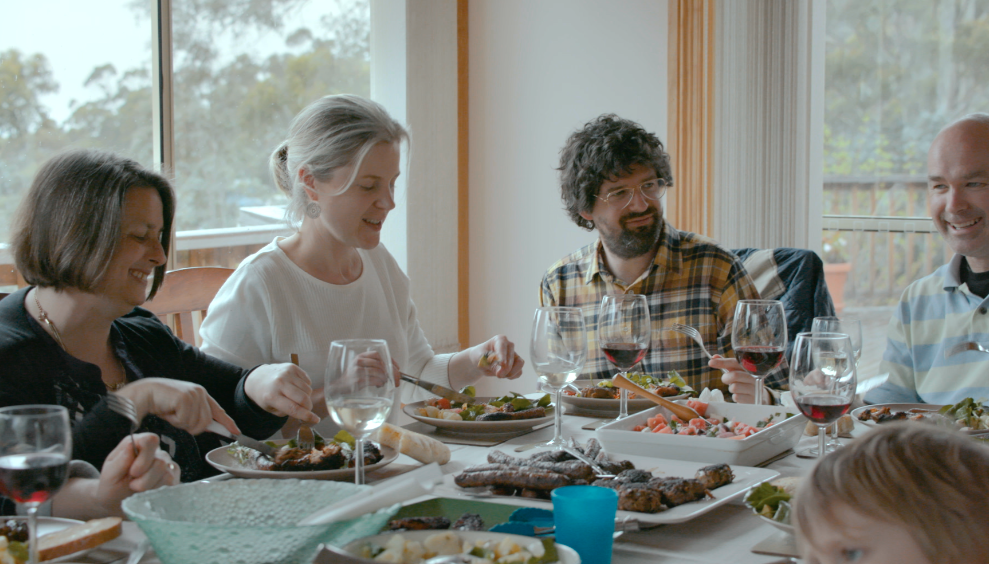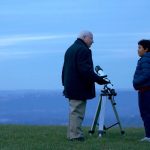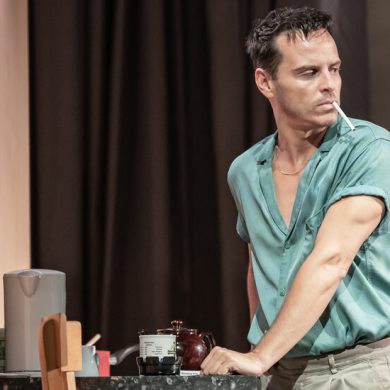Help keep The Curb independent by joining our Patreon.
Under the Cover of Cloud is the work of multi-hyphenate writer-director-actor-producer Ted Wilson, a man who employs the best people he knows (his family) to tell this story of a recently out of work journalist returning home to Tasmania. This is a quiet and loving film about family, one that shows the tenderness that creeps into day to day life of a supportive family.
The basic narrative thread continues once Ted arrives in Tasmania, with him embarking on a search for Hobart cricketer David Boon, hoping to interview him for a book concept about Tasmanian cricketers. Ted pokes and probes for possible leads on how to get in touch with Boon, suggesting that this might be the core focus of the film, raising a ‘will he’ ‘won’t he’ vibe to the mix, but instead, this is merely the open door that exists to allow conversations to naturally explore the meaning of cricket, or for families to weave tales from the past.
Ted Wilson prefers to create a meditative tone to explore this world, one that doesn’t rely on a traditional narrative. As each scene shifts into the next, you can see the points where other filmmakers would feel the pull of the expected filmic language, working to monopolise narrative beats for amplified drama, and accentuating the three-act structure. But this is not that film.
I haven’t given much thought to Tasmanian cinema before, but now I reflect on two of the films that have come from that section of the world – this and I Go Further Under – and I can see a different style of filmmaking emerging. This hyper-indie aesthetic is one born out of a desire to explore the often unexplored, the greatly undermined themes and moods that comes from a remote part of the world. These are films that have a distinct Tasmanian voice, and that voice is one that clearly works to elevate the importance of those who live in that part of the world.
Ted intends to write this book about cricket, not as a celebration of the sport of cricket, but instead to celebrate some of the great cricketeers that have hailed from that part of the world. It’s here that I personally connected with Ted’s story. I look at my part of the world – Perth, the ‘most isolated’ city in the world –, and I can see Ted’s desire to elevate those he admires, to put a spotlight on his idols, and to share his love for their work, I can see that as one and the same of my journey with this site. I won’t get too introspective in this review, this is not the place for that, as I don’t want to impede on Ted Wilson’s work, but I do hope that this writing helps elevate this film.
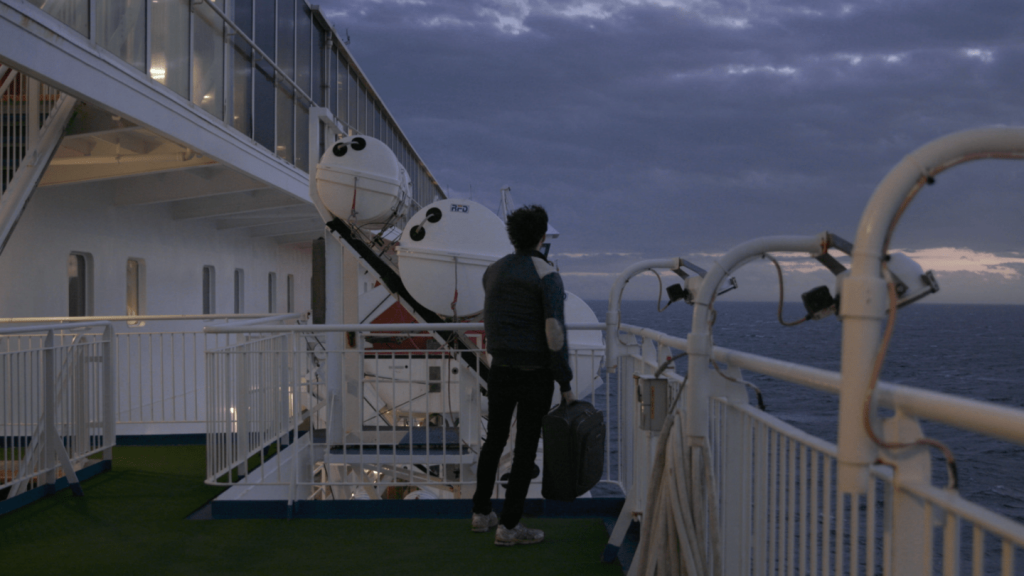

Moving on, it’s easy to make comparisons to American indie filmmakers of the past and present when it comes to Ted Wilson’s debut feature – Cassavetes comes to mind, as does Trey Edward Shults with Krisha – but let’s pare those comparisons back and look at the bones of what makes up the bulk of Under the Cover of Cloud. This is the work of a filmmaker who employs his family to help tell reflective stories of familial unity, and with that comes a kind of empathy and care that can only come from the age and time that comes with growing and nurturing a family.
There is precious little drama here, and while Ted is clearly processing the life change forced upon him, it’s the discussions about the minutia of life that make this a very moving film. I say that, knowing that this gives the impression that this is a sad film, and I want to stress, that’s not the case. Instead, this feels like an ode to familial support, a poem about the way families tell stories, and oddly, the most affectionate depiction of what it means to love a sport and its players intimately.
And yet, we so rarely see families just being, well, a family. I mentioned Krisha before, but that feels like a reductive comparison given how that film is a boiling pot of anxiety and tension surrounded by a Thanksgiving motif. Under the Cover of Cloud is not that kind of film at all. Moments where Ted spends time with his sister in a pub, or helps his mum tend to her garden, or a visit to the beach, or the gentle way this film wraps up with a simple song, these are all moments we rarely see on film. We’re so used to seeing manufactured drama, so expectant of tension, that we forget that life can simply exist with harmony.
Australia so rarely makes this kind of explorative film, one that straddles the line of fiction and documentary, and yet, that’s exactly what Under the Cover of Cloud is. It’s a love letter to the Wilson family, and a love letter to cricket.
On that point, Australia is a sports focused country, and for many who love and live for the arts, that unwavering affection can feel a little bit strange. Ted manages to explore the reasoning why someone would keep a catalogue of sports history in their mind. It is their life, it is who they are – and most importantly, when someone succeeds from relative obscurity, like Boonie did from Tasmania, then there’s that added element of familial respect and adoration. It could have been anyone, but in this case, it was Boon, and because of that, the whole of Tasmania will get behind him because his success is their success. When Ted sits down with David Boon, the conversation is caring, with Ted’s connection to Hobart being a common thread, and instead of it being a case of interviewer and subject, it is two Tasmanians coming together to talk about their part of the world. The ‘celebrity’ of David Boon is stripped back, after all, he is just like us – a person living a life.
Adding to this is the way Ted Wilson explores the act of writing. It’s hard to make the act of putting words to paper – digital or otherwise – engaging (one can’t help but cringe at the cigar chomping imagery of Bryan Cranston in a bathtub in Trumbo to get an idea of how exaggerated are willing to get to make writing filmic), and yet, as any writer will tell you, so much of what goes into writing is the time you spend not writing. Our lives are spent observing, collating memories, ideas, thoughts and themes, waiting for the moment when our hands tell us that they are ready to have the words let out of them. Ted makes the comment that ‘you have to be lazy to be a writer’, and while that is true to an extent, that laziness is more of a form of meditation than anything else. It’s the rest that the writers mind needs to allow it to conjure whatever narrative it wishes to tell.
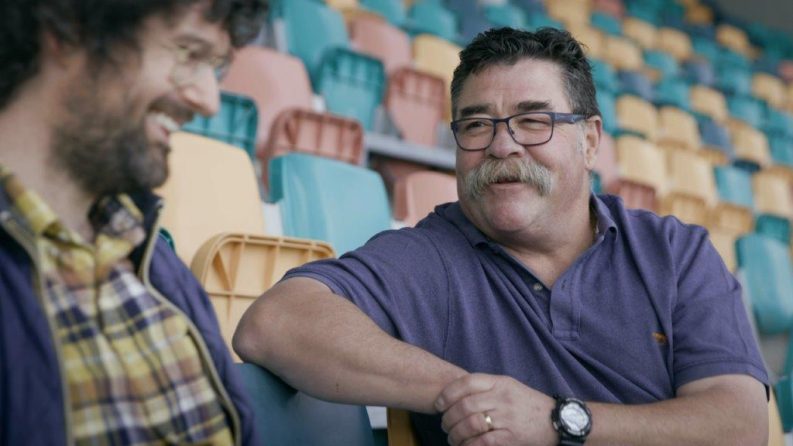

In this way, Under the Cover of Cloud is about the way stories are told, and how stories weave into life in different ways. The mood of a narrative will change over time, and the memories that were planted decades ago are revisited with new eyes. The death of someone long ago would have been a tragedy, but now, that same death becomes darkly comedic.
In one moment, Ted mentions the time that he had to cut Max Walker off during his speech because he was rambling too long on a story about pens. It’s here that the way a story is told is just as important as the story itself. One could have the grandest of tales, full of intrigue and excitement, but if it’s delivered in a tepid way, then that excitement is lost.
Not much happens in Under the Cover of Cloud, but that’s also the point. And in this way, it’s Ted Wilson’s way of exploring the concept of simply existing. A moment where he sits on a trampoline under rainclouds waiting to burst, watching chickens wander around a backyard, may feel extraneous, but instead it’s a perfect scene depicting how the writers mind works. We’re not privy to what is lingering in Ted’s mind at that moment, and thankfully we’re spared a voice over explaining his thoughts, but we can see that he’s thinking, mulling over the past, the present, the future, all at once.
I’m not sure what drives me to write. I’ve always enjoyed writing, and I’ve always found it to be a purely cathartic endeavour. I know many people find a vocation that hits that part of the brain that makes them feel good, and they stick with it. Maybe that’s what drove David Boon into being a cricketer. Maybe that’s what made Ted Wilson create this film. For me, I’ve not seen the writing process so intimately presented this way in an Australian film before.
Ted observing the chickens feels like he’s looking for inspiration in the fog of the world, trying to find the first word to kick off a novel. That inspiration inevitably comes from a core passion, and in many ways, he seeks to use his writing to elevate the legends that come from that passion. He seeks to retell their stories, much in the same way that I’m retelling Ted’s in this review, and by doing so, both he and I are participating in the further mythologising of our own idols. For Ted, he’s creating a work of adulation for the cricketing giants of Australia. For me, I’m hoping to elevate the filmmakers of Australia, the artists who create the work I could only dream of creating, and whose films and texts have inspired me in so many different ways.
I look to Under the Cover of Clouds as a way of making me feel comfortable with just existing. It furthers the affirmation that I didn’t know I needed about how we need to sit with the moments where we simply are. The observation of boats on the horizon, the tending to fruit trees, the planting of seedlings, the act of tidying up and tending to a home. These moments litter our days, they fill up the time in between the things we feel we should be doing. They’re often called chores, but really, without them, our lives would feel deceptively empty. In many ways, just like our families, just like our idols, just like the stories we tell, these moments of quiet give our life purpose.
This is an ordinary film, and I say that as a way of reclaiming the word ‘ordinary’. After all, there’s nothing wrong with being ordinary. If anything, ordinary should be celebrated, for ordinary is normal, and ordinary is comfortable. Under the Cover of Cloud presents ordinary and the quiet of life with such affection and care that you’re never bored. Instead, you’re left feeling grateful that you’ve spent a pleasant time with Ted and his family. The ease of their bond welcomes you, and by the end, you feel at one with them.
Director: Ted Wilson
Cast: Ted Wilson, David Boon, Jessie Wilson
Writer: Ted Wilson

